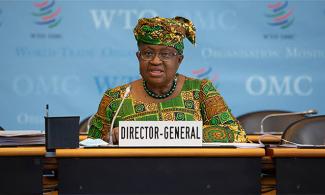
According to the WTO DG, global uncertainty was already limiting growth in trade and that would be exacerbated by the sudden onset of war between Israel and the Islamist Hamas group that controls the Gaza Strip.
The Director General of the World Trade Organisation (WTO), Ngozi Okonjo-Iweala, has warned that if the ongoing Israeli-Hamas war widens throughout the region and is not contained quickly, it would have a "really big impact" on global trade flows.
Okonjo-Iweala, who gave the warning in Morocco as she attends this week's annual meetings of the International Monetary Fund (IMF) and World Bank, said that the Israeli-Hamas war could add to factors hampering global trade growth, including higher interest rates, a strained Chinese property market and Russia's war in Ukraine.
Reuters quoted Okonjo-Iweala as saying, "We hope this ends soon and it's contained. Our biggest fear is if it widens, because that will then have a really big impact on trade. Everybody's on eggshells and hoping for the best."
According to the WTO DG, global uncertainty was already limiting growth in trade and that would be exacerbated by the sudden onset of war between Israel and the Islamist Hamas group that controls the Gaza Strip.
She said that "There is uncertainty about whether this is going to spread further to the whole region, which could impact very much on global economic growth. We hope it will end because it does create this uncertainty. It's another dark cloud on the horizon."
The WTO based in Geneva last week halved its growth forecast for global goods trade this year, citing persistent inflation, higher interest rates, the slowing Chinese economy and the war in Ukraine.
The organisation said merchandise trade volumes would increase by just 0.8% in 2023, compared with its April estimate of 1.7%.
For 2024, it said goods trade growth would be 3.3%, a forecast virtually unchanged from its April estimate of 3.2%.
The 164-member organization repeated its warning that it saw some signs of trade fragmentation linked to global tensions, but no evidence of a broader de-globalization that could threaten its 2024 forecast.